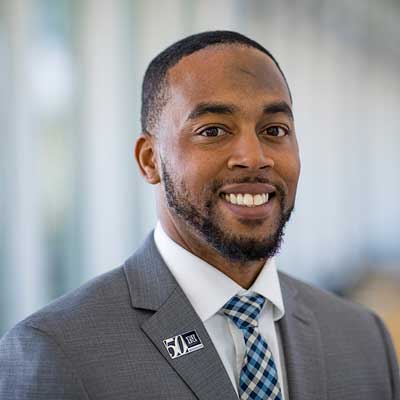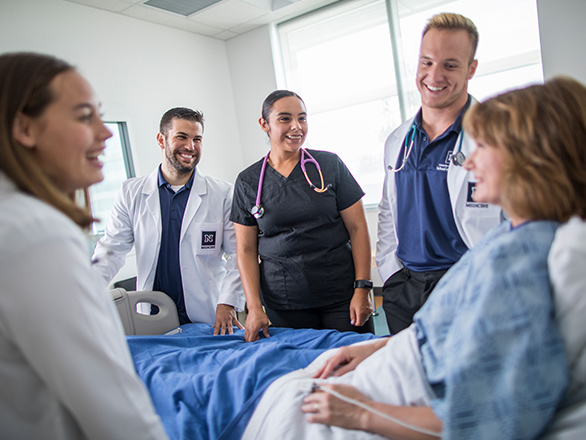Opportunity U sat down with Andre Lawson, Coordinator for Outreach and Recruitment at the University of Nevada, Reno School of Medicine, to talk about the path from high school to becoming a doctor.
Opportunity U: For high school students just getting started on this journey to medical school, can you give us quick rundown on the path to becoming a doctor?
Andre: The short version is that after high school, most students enroll at an accredited university where they will complete a bachelor’s degree. After their undergraduate degree, they’ll apply to medical school using the American Medical College Application Service (AMCAS). Part of the medical school application process is also taking the Medical College Admission Test (MCAT).
Once in medical school, you’ll have four years of undergraduate medical school education followed by graduate medical education (GME). GME is often called the “residency” part of a medical school, which varies from three to seven years. Once you complete your residency, you can work as a fully paid doctor or go on to add specializations. Adding a specialization often takes one to three years, depending on what you are studying, and is also called a fellowship program.
High school classes for pre-med students
Opportunity U: That was a great breakdown. I think we’re ready to dig into the details for our high school readers. As a high school student, what classes should I be taking? What if I’m not sure if I want to go to medical school and I’m trying to figure that out?
Andre: High school is a good time to figure out if medicine is right for you. I encourage high school students to take classes like chemistry, physics and biology to make sure they like the sciences. Medical school involves a whole lot of science. If you are someone that doesn’t like science, you’ll have to figure out if medical school is right for you. If these sciences classes are something you’re not interested in, you might want to stay away from medicine.
Opportunity U: Are there any other courses that really important to prepare for medical school?
Andre: Math. I would recommend taking calculus and statistics.
Opportunity U: Would do you think these kinds of courses have in common?
Andre: These classes show critical thinking skills, you’re problem-solving. These skills will be on display throughout your time in medical school.
Opportunity U: I noticed you didn’t mention environmental science or geoscience.
Andre: When medical schools look at an applicant’s grade point averages, or GPAs, we look at their BCPM. BCPM is the biology, chemistry, physics and math GPA. I encourage students that are thinking about medicine to get themselves ahead and prepared by pursuing a rigorous high school curriculum of Advanced Placement (AP) and/or International Baccalaureate (IB) courses in those subjects I mentioned.
Opportunity U: Can you talk about the AP or IB credits a little more?
Andre: You can start earning college credit in high school by taking AP exams. If you take an AP exam in high school and the university you attend for your bachelor’s degree recognizes your scores for college credit, our medical school will also accept them as courses for medical school admissions consideration. So, I would encourage students that take AP courses in high school, to take the AP exams as well.
Opportunity U: You talked about the math and sciences. How important is composition? For example, those English courses? How important is it for students to write well?
Andre: It’s important as well because students have to write personal statements for the medical school application process. You’ll need to write about your experiences and what you’ve done to prepare for medical school in a clear way. Does your statement have a clear beginning, middle and end? So, what did I do? What did a learn? And, how do I plan on applying that?
Extracurricular activities that prepare you for medical school
Opportunity U: Oooh, I like that. What did I do? What did I learn? How do I plan on applying what I’ve learned? What about extra-curricular activities? What should high school students look into being a part of?
Andre: Anatomy clubs, biology clubs and the Medical Explorers are offered at many schools. Especially Medical Explorers, they expose high school students to the medical field. If a high school has a neuroscience or science club or pre-med club, most high schools have a sports medicine club. Another organization is Doctors Without Borders, which is an international organization that provides medical professionals the opportunity to volunteer in high-need communities. The high school portion of Doctors Without Borders raises awareness and funds to help support the Doctors Without Borders mission.
Opportunity U: I didn’t realize that was available to high school students.
Andre: High school students that get involved with Doctors Without Borders can show their empathy and dedication to helping others, and that’s what being a physician is all about. It’s also an opportunity to take on a leadership role in Doctors Without Borders. There is also HOSA - Future Health Professionals, where high school students are exposed to the medical field and show off their knowledge during HOSA competitions. It’s great for students that are thinking about becoming doctors, nurses or pursuing any type of health-related career.
Opportunity U: And finally, can you give high school students a couple of skills that are also important to becoming a doctor outside of academics.
Andre: We call these soft-skills. The number one soft skill is collaboration.
Opportunity U: Why is collaboration so important?
Andre: Because you’ll be working in groups. In medicine you’ll be working with other physicians, nurses, technicians. When you’re a doctor, you’re not always the smartest doctor in the room. There may be a doctor that knows a little more than you in a certain area. So, being able to collaborate on how to best care for your patient is the ideal outcome. Even the lead physician has help from other professionals. A neurologist may need to work with an anesthesiologist or oncologist.
Opportunity U: You said it so well when you explained that the ultimate goal is to serve the patient well and in order to do that you need to lean on the skills of the people who are best suited for the needs of the patient. That’s something that I think a lot of people don’t think about. Thank you so much for taking the time to share your wealth of knowledge with us. We’d love to have your back on Opportunity U to share more medical school insights with our readers.
 Andre Lawson is a member of the UNR Med admissions team and serves as the Outreach and Recruitment Coordinator. Andre is housed in the University’s Las Vegas Office for Prospective Students. Andre has over eight years of experience in undergraduate recruitment and admissions with the University’s Las Vegas Office for Prospective Students. Andre established himself as a leading recruiter and admissions professional responsible for several of the largest feeder high schools in Las Vegas. Andre has been with UNR Med for two years. He has made it a focal point to be a valuable resource to both high school and current undergraduate students who wish to further their education by pursuing undergraduate, professional and graduate education.
Andre Lawson is a member of the UNR Med admissions team and serves as the Outreach and Recruitment Coordinator. Andre is housed in the University’s Las Vegas Office for Prospective Students. Andre has over eight years of experience in undergraduate recruitment and admissions with the University’s Las Vegas Office for Prospective Students. Andre established himself as a leading recruiter and admissions professional responsible for several of the largest feeder high schools in Las Vegas. Andre has been with UNR Med for two years. He has made it a focal point to be a valuable resource to both high school and current undergraduate students who wish to further their education by pursuing undergraduate, professional and graduate education.
Request more info
Do you have more questions we can answer? Are you interested in receiving additional information about the University, the admissions process, applying, financial aid or more?
